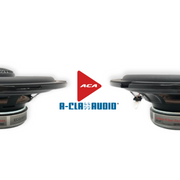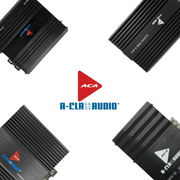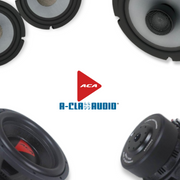Installing a new speaker system in your car can transform your driving experience, making every journey more enjoyable with superior sound quality. However, with a multitude of options on the market, it can be difficult to know where to start. Here's a detailed guide to help you choose the best speakers for your car.
1. Understand the Different Types of Speakers
There are mainly two types of car speakers: coaxial speakers and component speakers.
-
Coaxial (or Full-Range) Speakers : These speakers integrate several elements (woofer, tweeter, etc.) into a single unit. They are easy to install and are well suited to users looking for a quick and easy upgrade to their stock audio system.
-
Component Speakers : This system separates the different elements (woofer, tweeter, etc.) to offer better sound quality. They require more complex installation but provide a superior audio experience with better frequency separation.
2. Consider Size and Compatibility
Before purchasing speakers, it is crucial to check the size and compatibility with your vehicle. Speakers come in several sizes (4”, 5.25”, 6.5”, etc.), and it is important to choose a size that fits your car's speaker locations.
-
Measure the speaker locations : Use a tape measure to measure the diameter and depth of the existing locations.
-
Check your car's manual : Your vehicle's owner's manual may also provide information on compatible speaker sizes.
3. Check the Power (Wattage)
Speaker power is another crucial aspect to consider:
-
RMS Power : Represents the continuous power the speaker can handle. It is more important than the maximum (or peak) power, because it indicates the actual performance of the speaker.
-
Peak Power : Indicates the maximum power the speaker can handle for short periods of time.
Make sure the RMS power of your speakers is compatible with your amplifier or car stereo to avoid component damage.
4. Sensitivity and Effectiveness
Sensitivity measures how effectively speakers convert power into sound. It is expressed in decibels (dB). A speaker with higher sensitivity (for example, 90 dB or more) requires less power to produce loud sound, which is ideal for audio systems with less powerful amplifiers.
5. Quality of Materials
The materials used in speaker construction also affect sound quality and durability:
-
Woofer : Polypropylene woofer cones are common for their durability and good bass response. Fiberglass or Kevlar cones offer better performance but at a higher cost.
-
Tweeter : Tweeters made of silk, textile, or polypropylene produce a soft sound, while those made of metal (such as aluminum or titanium) produce a brighter, more precise sound.
6. Adapters and Accessories
When installing new speakers, you may need adapters to connect and secure them properly. This may include:
- Mounting Adapters : Useful if the size or shape of your new speakers does not match the original locations exactly.
- Wiring Adapters : Needed to connect new speakers to existing wires without having to cut or modify the car's original wiring.
These adapters make installation easy and provide a secure, stable connection, preserving the integrity of your vehicle's electrical system.
7. Installation and Accessories
Speaker installation can vary in complexity. If you're not comfortable with installation, consider hiring a professional. Additionally, consider necessary accessories such as protective grilles and additional cables for a clean and secure installation.
Conclusion
Choosing the right speakers for your car requires considering several factors, including speaker type, size, power, sensitivity, materials, and installation. By following this guide, you can make an informed choice that will transform your in-car audio experience. Remember to always check user reviews and, if possible, test speakers before purchasing to make sure they meet your expectations. Happy installation and enjoy your new sound quality on the road!




